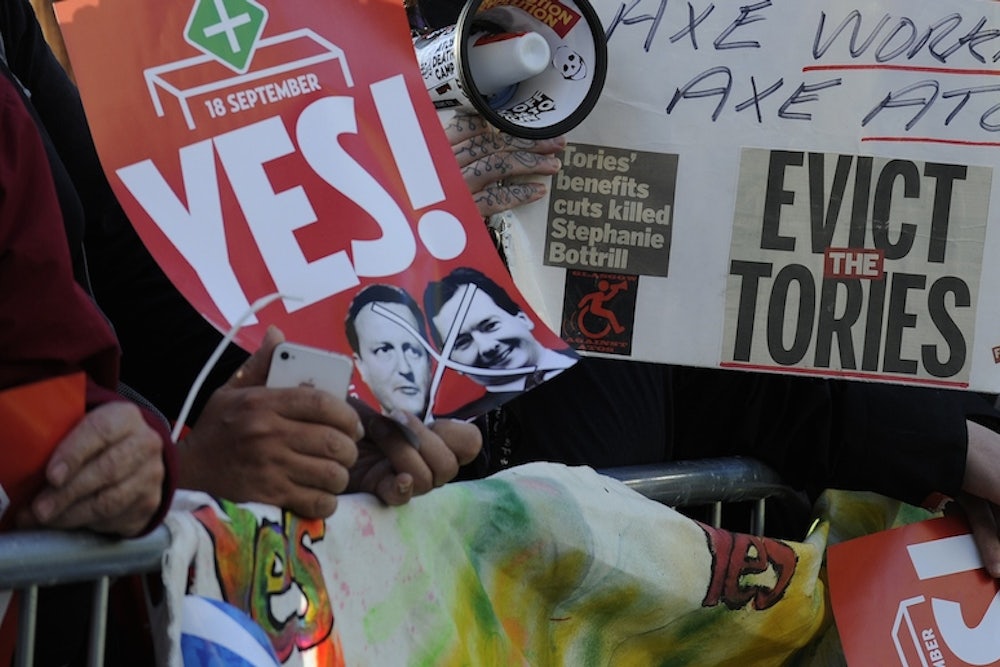For decades, the prevailing British political narrative has pitted conservative (or “Tory”) England against leftish Scotland. Mention Margaret Thatcher to a Scotsman, and be prepared for a flurry of choice swears. The independence campaign has very cleverly played on Scottish resentment of the Tories, so much so that the conservative British Prime Minister David Cameron pleaded with the Scottish people not to vote for independence just “to give the effing Tories a kick.”
The flip side of Scotland’s famous hatred of the Tories is its dedicated adherence to the Labour Party. Currently, Labour holds 41 of the 59 Scottish parliamentary seats, while the Tories have only one. Conventional wisdom holds that an independent Scotland would be a nightmare for Labour, which relies on Scottish votes and could lose all hope of regaining parliamentary control in upcoming elections. But in reality, it’s not that simple. It’s true that life would be much harder for Labour with an independent Scotland, but a U.K. sans Scotland could be as much of a disaster for the Tories as it might be for Labour.
Should Scotland vote yes next Thursday, David Cameron would almost certainly be obliged to resign, forever remembered as the leader who lost the 307-year-old Union and forfeited a third of the nation’s landmass and 8 percent of its population. Cameron has said that he won’t step down, and there’s no law obligating him to, but, nevertheless, pressures to do so would be immense, and his departure would leave the Tories with a leadership vacuum in advance of the May 2015 general election. The Tories are already trailing Labour by five to seven percentage points in the polls.
Even if David Cameron managed to stay at the head of the Conservative Party, 2015 is surely Labour’s year, in part because Scottish voters will participate in that general election regardless of the result of the referendum. The actual separation of the Union—were it to occur—would be scheduled for March 2016, so the Scottish MPs would be elected as usual in May, take their seats in Parliament, and then leave in the spring of 2016, when their positions are abolished. Scotland’s participation all but seals the deal for Labour.
But what about after Scotland officially leaves? The Tories still wouldn’t have a guaranteed majority. True, Labour would lose 41 seats that they have been all but guaranteed; the Tories would lose only one. But the Tories have an additional factor working against them: United Kingdom Independence Party (Ukip), the far-right, anti-European Union, anti-immigration party that has surged to prominence in the past few years is already beginning to split the Tory vote. A Guardian analysis of 2013 local elections showed that in many districts, Ukip took enough votes away from the Tories to ensure that other parties won. And that wasn’t an isolated incident: A YouGov study showed that the Tories are losing six times more voters to Ukip than Labour, who are also gaining seats from the struggling Lib-Dems.
It’s not just voters who are jumping ship. Several Tory politicians have recently made the switch to Ukip, and former Tory MP Douglas Carswell, who had served in Parliament since 2005, is on course to become the first-ever Ukip MP. More defections are on the horizon: More than a dozen Tory MPs are defying party orders and refusing to campaign against Carswell, and the BBC even profiled eight MPs likely to leave the Tories behind. With or without Scotland, the future of the Tory party is on the line.
Moreover, people tend to overplay the English/Scottish power dichotomy, which not only ignores Wales and Northern Ireland but is statistically unjustified. An analysis by the House of Commons showed that only two post-war elections, 1964 and 1974, would have ended differently had Scotland been a separate nation. Tony Blair, the most significant Labour leader in recent history, would still have come to power without Scottish votes, and a similarly charismatic and influential Labour leader could repeat the victory.
Beyond the nitty-gritty of votes and parliamentary seats, the Scottish referendum could usher in a new era in British politics. This could be the death knell of Britain’s two-party system, which is already on its last legs. Over the past 30 years, it has become increasingly difficult for a single party to win power, with parties like the Lib-Dems, Ukip, and the Scottish National Party challenging the traditional duopoly. In 1951, the Tories and Labour won 97 percent of votes; by 2010, their share was down to 65 percent. The current marriage of convenience between the Tories and the Lib-Dems already shows the rise of coalition government and third-party power, and Ukip and the Greens are further chipping away two-party dominance. If Scotland leaves the Union, the U.K. will have to completely overhaul its governmental system, and that could mean that it finally embraces its multi-party reality. Soon, talk of Tory dominance or Labour vulnerability may be irrelevant.
Independence would plunge Scotland into a brave new world. It would rip apart the pillar of British identity and challenge the U.K.’s standing in the world. But of all the dramatic changes it would bring about, the one thing it would not ensure, whatever the popular belief, is Tory rule of Britain. Whatever’s left of Britain, that is.
No, Scottish Independence Would Not Guarantee Permanent Tory Rule
It’s bad news for Labour and Conservative alike.

Andy Buchanan/Getty Images